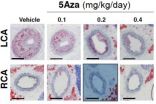(Press-News.org) London's international fish trade can be traced back 800 years to the medieval period, according to new research published today in the journal Antiquity.
The research, led by archaeologists from UCL, Cambridge and UCLan, provides new insight into the medieval fish trade and the globalisation of London's food supply.
Archaeologists analysed data from nearly 3,000 cod bones found in 95 different excavations in and around London. They identified a sudden change in the origin of the fish during the early 13th century, indicating the onset of a large-scale import trade.
Lead author Dr David Orton, UCL Institute of Archaeology, said: "It's a truly remarkable shift. We had expected a gradual increase in imports as demand grew along with the city's medieval population – thought to have quadrupled between AD 1100 and AD 1300 – but this is something else: evidence for locally caught cod drops off suddenly when the imports come in.
"What did this mean for the local fishing industry? Until we've looked at other fish species and other towns we can't be sure, but the start of this long-range trade may well be an important message about changes in supply and demand."
Cod were traditionally decapitated as part of preservation for long-range transport, meaning the researchers knew that head bones found during excavations must represent fresh fish from relatively local waters.
Vertebrae, by contrast, might be either local or imported.
Comparing frequencies of the two over time, the researchers discovered the sudden switch 'from heads to tails' during the early 13th century. To confirm that the vertebrae were from distant waters, the team used biochemical signatures to match some of the individual bones to their most likely sources, with the results supporting the archaeological data perfectly: from the middle of the 13th century, the majority of sampled bones have signatures suggesting an origin in the far north, probably Arctic Norway.
Co-author Dr James Barrett, University of Cambridge, added: "This discovery clarifies an important rapid shift in the demand for distant food resources of one of Europe's major centres. It shows us that local fishing could no longer keep up with this demand, that London's ecological footprint was increasingly extensive and that growing trade connections were making the world a smaller place in the century before the spread of the Black Death".
The research also shows a temporary drop in imports in the late 14th century that might reflect the Black Death's impact on European trade, plus a further surge in imports from around AD1500 - coinciding with the beginnings of trans-Atlantic trade and the arrival of cod from Newfoundland on European markets.
This kind of archaeological data-mining is made possible by London's archaeological contractors – particularly Museum of London Archaeology (MOLA), who each year excavate dozens of sites threatened by development and who opened their database to the researchers – and by the London Archaeological Archive and Research Centre that curates the resulting finds and data.
INFORMATION:
Notes to Editors:
1. For more information, copies of the paper, or to interview the researchers involved, please contact Ruth Howells in the UCL Media Relations Office on office:+44 (0)20 3108 3845 mobile: +44 (0)7990 675 947, email: ruth.howells@ucl.ac.uk
2. The paper 'Fish for the city: meta-analysis of archaeological cod remains and the growth of London's northern trade' is published online in the journal Antiquity, embargoed until 00.01 UK time on Wednesday 28 March 2014.
3. The research was funded by the Leverhulme Trust and the Fishmongers' Company (London).
4. An image of a fish skeleton, taken from the paper, is available on request from UCL Media Relations.
Cod bones reveal 13th century origin of global fish trade
2014-05-28
ELSE PRESS RELEASES FROM THIS DATE:
Butterfly 'eyespots' add detail to the story of evolution
2014-05-28
CORVALLIS, Ore. – A new study of the colorful "eyespots" on the wings of some butterfly species is helping to address fundamental questions about evolution that are conceptually similar to the quandary Aristotle wrestled with about 330 B.C. – "which came first, the chicken or the egg?"
After consideration, Aristotle decided that both the egg and the chicken had always existed. That was not the right answer. The new Oregon State University research is providing a little more detail.
The study, published today in Proceedings of the Royal Society B, actually attempts to ...
Should sugary drinks carry a health warning?
2014-05-28
In a personal view published on bmj.com today, a professor of public health at a leading university thinks there should be health warning labels on sugary drinks.
Professor Simon Capewell, professor at the University of Liverpool, highlights that the State of California is considering a new health bill. One which will see sugary drinks labelled with health warnings, vending machines to bear warning labels, and fines of between $50 and $500 per failed inspection".
Professor Capewell thinks this is a good idea, and one that the UK public would support.
He says that ...
Higher NHS spending in deprived areas can reduce health inequalities
2014-05-28
A policy of higher NHS spending in deprived areas compared with affluent areas is associated with a reduction in absolute health inequalities from causes amenable to healthcare in England, suggests a study published on bmj.com today.
In 1999, the government introduced a new 'health inequalities' objective for the allocation of NHS resources in England, which resulted in greater NHS spending in deprived areas with the worst health outcomes. But it is not known whether this policy was successful in contributing to a reduction in health inequalities.
So researchers based ...
School scheme unable to boost healthy eating and activity among kids
2014-05-28
A school-based scheme to encourage children to eat healthily and be active has had little effect, conclude researchers in a study published on bmj.com today.
The findings have relevance for researchers, policy makers, public health practitioners, and doctors, and they suggest that more intense interventions may be required.
Low levels of physical activity and of fruit and vegetable consumption in childhood are associated with adverse health outcomes. School based interventions have the potential to reach the vast majority of children, and evidence reviews have suggested ...
Barriers to HIV testing in older children
2014-05-28
Concerns about guardianship and privacy can discourage clinics from testing children for HIV, according to new research from Zimbabwe published this week in PLOS Medicine. The results of the study, by Rashida A. Ferrand of the London School of Hygiene & Tropical Medicine and colleagues, provide much-needed information on how to improve care of this vulnerable population.
More than three million children globally are living with HIV (90% in sub-Saharan Africa) and in 2011 an estimated 1000 infant infections occurred every day. HIV acquired through mother-to-child transmission ...
Making research findings freely available is an essential aid to medical progress
2014-05-28
In a PLOS Medicine guest editorial, Paul Glasziou, Professor of Evidence-Based Medicine at Bond University in Australia, explores how open access publications could help moderate and reduce the vast waste of global medical research.
Continuing on from his previous work, which highlighted how most of the world's expenditure on medical research was thrown away, Glasziou outlines how bad the situation is and suggests how it might be improved. Subscription-based academic journals make money by through copyrights assigned by authors to publishers who lock the articles behind ...
Dealing with stress -- to cope or to quit?
2014-05-28
Cold Spring Harbor, NY – We all deal with stress differently. For many of us, stress is a great motivator, spurring a renewed sense of vigor to solve life's problems. But for others, stress triggers depression. We become overwhelmed, paralyzed by hopelessness and defeat. Up to 20% of us will struggle with depression at some point in life, and researchers are actively working to understand how and why this debilitating mental disease develops.
Today, a team of researchers at Cold Spring Harbor Laboratory (CSHL) led by Associate Professor Bo Li reveals a major insight ...
Intertwined evolution of human brain and brawn
2014-05-28
The cognitive differences between humans and our closest living cousins, the chimpanzees, are staggeringly obvious. Although we share strong superficial physical similarities, we have been able to use our incredible mental abilities to construct civilisations and manipulate our environment to our will, allowing us to take over our planet and walk on the moon while the chimps grub around in a few remaining African forests.
But a new study suggests that human muscle may be just as unique. Scientists from Shanghai's CAS-MPG Partner Institute for Computational Biology, together ...
Disturbance in blood flow leads to epigenetic changes and atherosclerosis
2014-05-28
Disturbed patterns of blood flow induce lasting epigenetic changes to genes in the cells that line blood vessels, and those changes contribute to atherosclerosis, researchers have found. The findings suggest why the protective effects of good blood flow patterns, which aerobic exercise promotes, can persist over time. An epigenetic change to DNA is a chemical modification that alters whether nearby genes are likely to be turned on or off, but not the letter-by-letter sequence itself.
The results are scheduled for publication in the Journal of Clinical Investigation.
Atherosclerosis ...
Keeping active pays off even in your 70s and 80s
2014-05-28
Older people who undertake at least 25 minutes of moderate or vigorous exercise everyday need fewer prescriptions and are less likely to be admitted to hospital in an emergency, new research has revealed.
The findings, published in the journal PLOS ONE, reinforce the need for exercise programmes to help older people stay active. It could also reduce reliance on NHS services and potentially lead to cost savings.
In the first study of its kind looking at this age group, researchers from the University of Bristol looked at data from 213 people whose average age was 78.
Those ...


